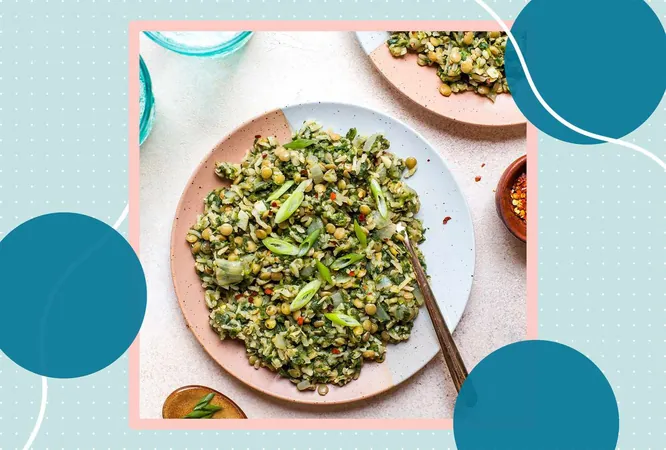
This Little-Known Nutrient Might Slash Your Colon Cancer Risk by 30%, New Research Reveals!
2025-04-11
Author: Mei
Colorectal Cancer: A Growing Concern
Colorectal cancer is among the most prevalent cancers globally, ranking as the third most diagnosed for men and second for women, with nearly 2 million new cases reported in 2020 alone. In Korea, the situation is alarming, with rates climbing approximately 2.6% annually since 2019.
Controllable Factors in Cancer Risk
While some risk factors, like genetics, are beyond our control, others—including smoking, excessive alcohol consumption, sedentary lifestyles, and dietary choices—are entirely manageable. Recent studies have pointed to red and processed meats as potential culprits in elevating colon cancer risk, possibly due to a component called heme iron. This type of iron, prevalent in animal-based foods, is absorbed more efficiently by our bodies compared to non-heme iron, which is found in plant sources.
Mixed Messages on Iron and Cancer Risk
Research on heme iron's connection to colon cancer yields mixed results: while some findings suggest heightened risk, especially in Western nations, others indicate minimal risk—particularly in Asian countries like Japan. These discrepancies suggest that factors such as gender, geography, and dietary habits could significantly influence these outcomes.
Groundbreaking Study in Korea
To understand the impact of different iron sources on colorectal cancer risk among a large cohort of healthy Koreans, researchers executed a study published in the journal Nutrients. They assessed participants' iron intake through detailed food questionnaires administered at the start of the study, covering 106 common foods in the Korean diet.
How They Did It
Researchers utilized extensive data from The Korean Genome and Epidemiology Study’s Health Examinees cohort, tracking 109,908 individuals (37,697 men and 71,401 women) for an average duration of 9.1 years. They identified colorectal cancer cases using the Korea Central Cancer Registry and collected a host of demographic and lifestyle data.
Impressive Findings
Out of the participants, 608 were diagnosed with colorectal cancer (CRC). Those with moderate iron intake showed a significantly lower risk of developing CRC, particularly colon cancer. Moderate intake was categorized as 5.00-6.27 mg per day—akin to a serving of lentils and rice with spinach. Those who consumed a moderate amount of non-heme iron experienced a 25% reduction in CRC risk and a remarkable 30% drop in colon cancer risk.
The Power of Non-Heme Iron
Men in the moderate non-heme group exhibited an even greater decrease in risk: a 32% lower chance of CRC and a 44% lower risk of colon cancer. Interestingly, more wasn’t necessarily better—most protective effects occurred at moderate levels, suggesting a need to maintain balance in iron consumption.
Real-Life Implications
While headlines often scapegoat red meat in relation to cancer, this study offers nuanced insights, suggesting moderation is key. Americans frequently consume more meat than recommended, leading to excess heme iron and other health issues. Instead of eliminating meat, focus on portion control and enrich your meals with plant-based foods, which provide essential nutrients like fiber.
Conclusion: Balance is Key!
This landmark study emphasizes the importance of balanced nutrient intake. Moderate consumption of both heme and non-heme iron correlates with reduced colorectal cancer risk, particularly in populations with low overall iron intake. By incorporating iron-rich plant sources like lentils, spinach, and tofu, you can cultivate a diet that not only promotes health but also brings you joy. Remember, moderation is crucial—excess iron can be harmful, so find harmony in your diet to support your overall wellness.

 Brasil (PT)
Brasil (PT)
 Canada (EN)
Canada (EN)
 Chile (ES)
Chile (ES)
 Česko (CS)
Česko (CS)
 대한민국 (KO)
대한민국 (KO)
 España (ES)
España (ES)
 France (FR)
France (FR)
 Hong Kong (EN)
Hong Kong (EN)
 Italia (IT)
Italia (IT)
 日本 (JA)
日本 (JA)
 Magyarország (HU)
Magyarország (HU)
 Norge (NO)
Norge (NO)
 Polska (PL)
Polska (PL)
 Schweiz (DE)
Schweiz (DE)
 Singapore (EN)
Singapore (EN)
 Sverige (SV)
Sverige (SV)
 Suomi (FI)
Suomi (FI)
 Türkiye (TR)
Türkiye (TR)
 الإمارات العربية المتحدة (AR)
الإمارات العربية المتحدة (AR)